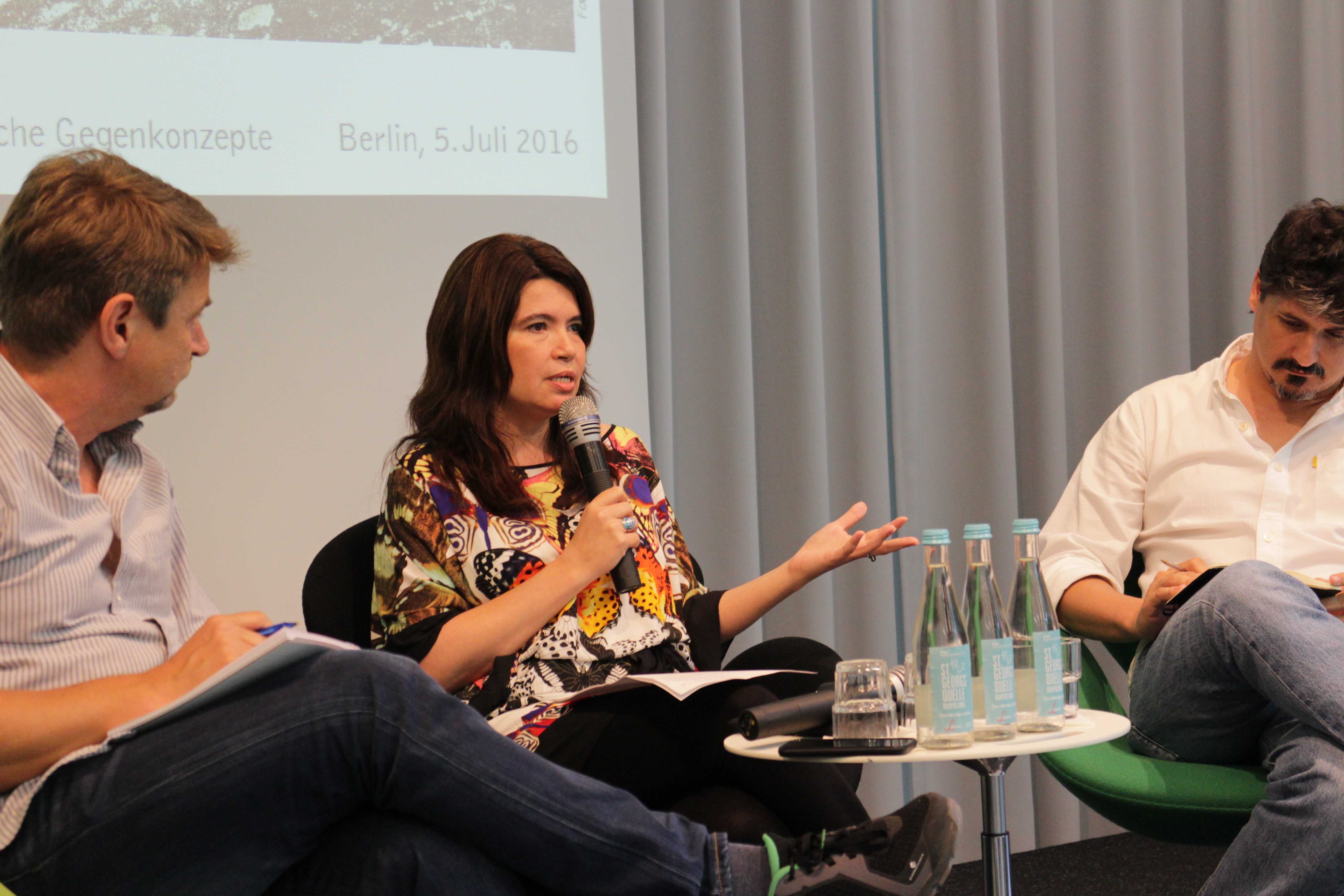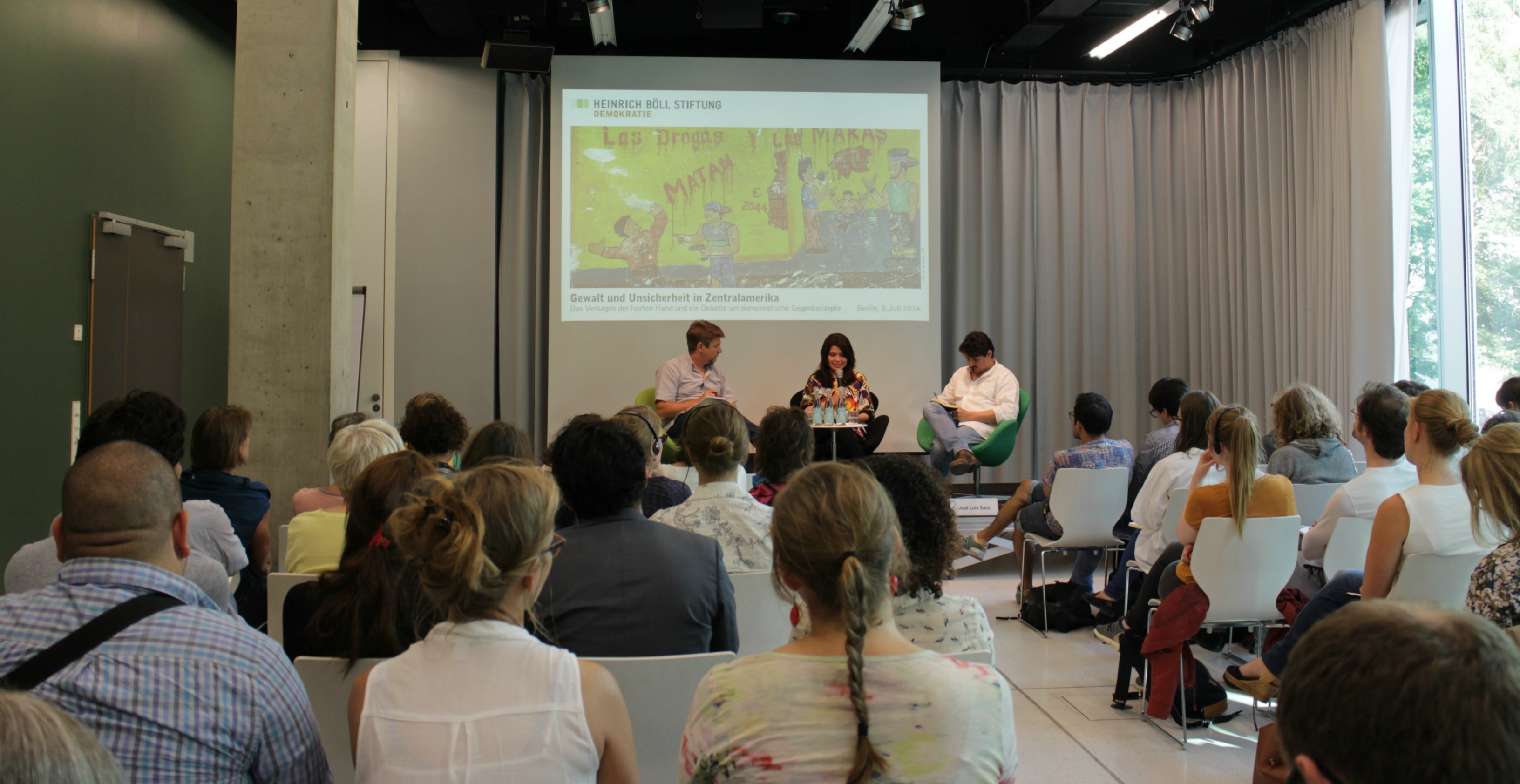Violence and insecurity in Central America: Failure of the hard-fisted policies and its democratic alternatives

On July 5th 2016, the Heinrich Böll Foundation invited Ana Glenda Tager, Interpeace’s Regional Director for Latin America, and José Luis Sanz, Director of the Salvadoran newspaper El Faro, to participate in a public debate entitled: “Violence and Insecurity in Central America: The Failure of the Hard-Fisted Policies and the Debate on Alternative Democratic Concepts.” Bernd Pickert, journalist of the German Newspaper Die Tageszeitung, moderated the debate, which took place in Berlin.

Ana Glenda Tager, Interpeace’s Regional Director for Latin America; José Luis Sanz, Director of the Salvadoran newspaper El Faro; and Bernd Pickert, journalist of the German Newspaper Die Tageszeitung.
A third of the world’s overall homicides occur in Latin America. The Northern Triangle of Central America, conformed by Guatemala, Honduras and El Salvador, have the highest murder rates in the world. The homicide rate in El Salvador in 2015, was of 116 for every 100,000 people. And in Guatemala and Honduras, the homicide rate was 60 for every 100,000. In contrast, the world’s average homicide rate is 6.2 for every 100,000 citizens.
According to the Organization of American States, victims are mostly men between the ages of 20 and 30. However, the number of femicides and homicides of members of the LGBT community are increasing.
These issues have led to a series of unfortunate consequences within society. They have generated mistrust, broken social cohesion and have imposed a social order, were violent reactions are encouraged in a vicious cycle. At the same time, they have raised social tolerance to violence, illegal forms of economy and the loss of thousands of lives.
So far the problem has been tackled through repressive means, using the so-called Mano Dura or Hard-Fisted policies. The State’s indifference to solve these social issues has led to an excessive involvement of the Army in public security. Interpeace’s experience shows that a preventive approach to these issues is necessary to transform violent dynamics, from a peacebuilding perspective. However, this preventive focus must be placed on all the actors involved in violence and not only on young vulnerable adults, as it is usually done.
At the same time a tertiary prevention is also pivotal, which would focus on the work done with prisoners, given the direct relation between the detention centers and criminal dynamics.
Through dialogue, Interpeace seeks to strengthen the bonds of trust, shorten the distance between all actors of society, including the most marginalized and stigmatized and therefore stimulate the development of non-violent and collaborative solutions to the challenges faced by society.
Parallel events to the Public Debate
As part of Ana Glenda Tager’s visit to Berlin, she participated in a series of meetings organized by the Heinrich Böll Foundation:
- A debate with journalists and activists from Berlin that work in NGOs based in Central America: Amnesty International, Misereor, Brot für die Welt, INKOTA (INformation, KOordination, TAgungen), Berghof Foundation and the German Institute for Human Rights.
- An open exchange of ideas about violence and insecurity in Central America with important representatives of the German Parliament and Government: Tom Koenigs and Hans-Christian Ströbele, Congressmen of the Green Party in Parliament, Wolfgang Hoelscher-Obermaier, Deputy Head of Division for Latin America at the German Foreign Office, and Ulrike Metzger, Deputy Head of Regional Development for Central America of the Federal Ministry for Economic Cooperation and Development.
- A visit to the House of the Wannsee Conference: Memorial and Educational Site, guided by the Director of Education, Elke Gryglewski. The visit to this iconic place illustrates the importance of historic memory in peacebuilding processes and it serves to remind us that peacebuilding efforts are fundamental in our contemporary world.























